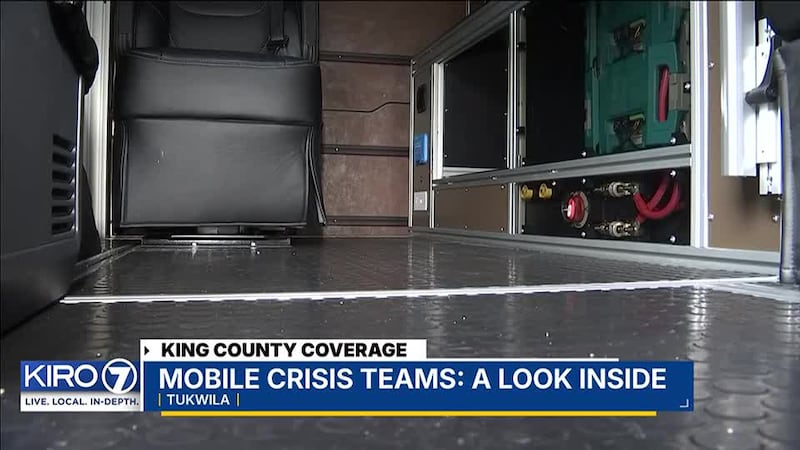New mobile crisis teams have been deployed throughout King County, offering expanded access to immediate mental health care and alleviating the burden off other agencies that may be less equipped to handle a mental health crisis.
The county added 10 teams on December 2 to support adults experiencing a mental health emergency. While the county previously had mobile crisis teams, this milestone marks a major expansion, made possible by funding approved by voters last year.
The teams are operated by the Downtown Emergency Service Center (DESC) and SOUND Behavioral Health. DESC operates the teams in Seattle and Vashon, while SOUND provides services in North, East and South King County.
The two-person teams will deploy to individuals experiencing a mental health crisis, and will also provide resources and connections to services to help mitigate future crises too.
KIRO 7 received an exclusive first look inside SOUND’s new vans, equipped like a mobile mental health clinic with desks, technology, first aid supplies, food, water and more.
“We’re here and we’re in lieu of a police officer,” said Joe Vela, Crisis Services Director at SOUND. “We are better equipped, both clinically, and making connections with our peers, to deal with someone in crisis in the community.”
The service is available for all adults, regardless of insurance status, including Medicaid clients.
The expanded service will reduce response times and help improve access, while alleviating the burden on other agencies.
“There’s nothing more disheartening than somebody coming to you and saying, ‘I’m here for help,’ and the only place you can send them is an emergency department or a shelter,” said Katrina Egner, President and CEO of SOUND.
These teams help fill in the gaps.
In the last two and a half weeks, Vela estimates the teams at SOUND have already responded to over 20 or 30 calls.
“It was our first call in SeaTac (Airport). Gentleman, French, very limited speaking,” he said. “They pulled out Google Translate, and they started talking. They were able to manage to get him and transport him to a shelter.”
The service is voluntary, so individuals will have to consent to receiving care. However, if you see someone on the street who appears to be experiencing a mental health crisis, you can still call or text 988. The teams can still attempt a response and provide resources to the individual.
“If you walked by somebody and they were having a heart attack, you’d call 911,” Egner said. “So if you’re walking down the street and somebody’s clearly struggling, you can call 988.”
The teams are part of King County’s broader push to expand and streamline mental health services, by providing dispatchers to talk to, teams to respond and crisis care centers where individuals in crisis can go.
The county has committed to establishing a network of five crisis care centers, which will operate like urgent care centers for mental health concerns.
Next year, King County will also add two new mobile crisis teams for kids.
©2024 Cox Media Group








